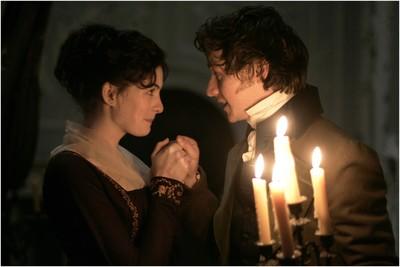‘Becoming Jane’

Write what you know.
That’s certainly true for Jane Austen, who — despite a short and relatively circumscribed life in late 18th- and early 19th-century England — managed to write six novels that have earned her a permanent place in the pantheon of English literature.
It’s certainly not true of the folks behind "Becoming Jane," a "Shakespeare in Love"-style speculation on what inspired a country clergyman’s clever daughter to become the acute, astute social observer whose scintillating wit and psychological insight shine through in such imperishable literary classics as "Pride and Prejudice," "Sense and Sensibility," "Emma" and "Persuasion."
Much of it is sheer speculation, of course, as we all know that Austen never married during her sadly abbreviated 41-year life.
Yet the creators of "Becoming Jane" — director Julian Jerrold ("Kinky Boots") and his screenwriters, British TV veterans Kevin Hood and Sarah Williams — seize upon her documented flirtation with an Irish law student to dream up a highly diverting, utterly charming period romance.
"Becoming Jane" introduces us to the feisty, dreamy Jane (Anne Hathaway, another all-American scoring in a true-Brit role), scribbling away as her garrulous mother (Julie Walters) despairs of ever marrying her off.
Enter the rakish Tom Lefroy ("Last King of Scotland’s" jaunty James McAvoy), a high-spirited law student sent to visit his country cousins by his uncle and benefactor, a stern London judge (the late Ian Richardson).
Naturally, the dashing Lefroy flirts with the budding writer, urging her to broaden her "horizons" — among other things — if she hopes to pursue the scandalous practice of writing novels.
Inevitably, their sparkling war of words sparks romance — much in the manner of "Pride and Prejudice’s" Miss Elizabeth Bennet and Mr. Fitzwilliam Darcy. (Although Lefroy boasts more than a few traces of the wicked Mr. Wickham as well.)
The resemblance is hardly coincidental. Much of the fun comes in playing mix-and-match with the characters and their literary counterparts, from the imperious Maggie Smith as a notable noble to James Cromwell as Jane’s father, who encourages her individuality despite his wife’s fears that their daughter will end up an impoverished spinster if she insists on marrying for love.
After all, that’s exactly what Austen’s heroines do, rewarded for their stubborn convictions by happily-ever-aftering (we hope) with the Mr. Darcy (or Mr. Knightley or Mr. Ferrars or Captain Wentworth) of their dreams.
Ah, but it is a truth universally acknowledged — at least in Austen’s case — that, despite speculative flirtations with true love, happy endings don’t necessarily translate to the real world. "Becoming Jane" acknowledges as much, undercutting our expectations by suggesting that, unlike Austen’s heroines, the beloved author herself may not end up with her heart’s desire.
As a result, "Becoming Jane" builds subtle but genuine dramatic heft, even as it revels in its lovely settings (Ireland, standing in for 1790s Hampshire) and sumptuous period detail.
And while the movie’s implication that Austen might never have become a literary giant without experiencing love seems downright heretical, "Becoming Jane’s" many pleasures help atone for such an entirely outrageous notion.